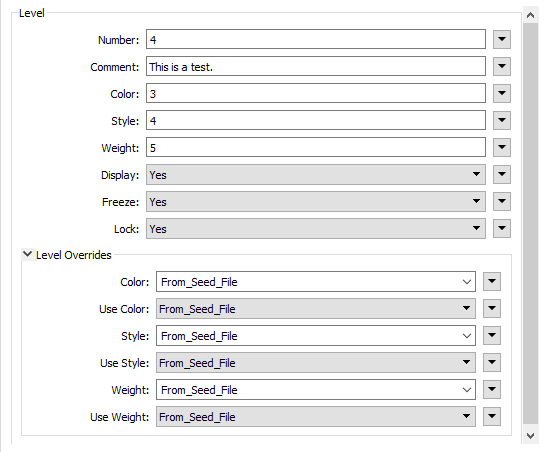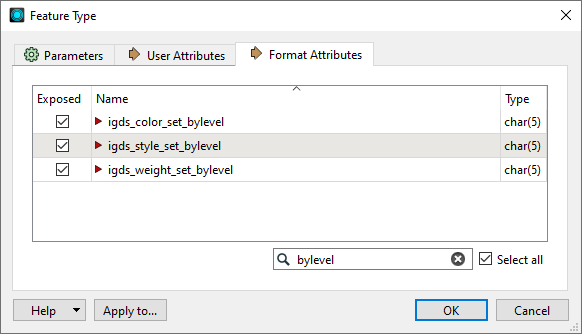|
To access feature type parameters, click the gear icon Tip To always display the editor in FME Workbench, you can select View > Windows > Parameter Editor.
General All feature types share similar General parameters, which may include Feature Type Name, Reader or Writer information, and Geometry. In most Writer Feature Type parameter dialogs, you can also control Dynamic Schema Definitions. Some database formats accept Table or Index Qualifier prefixes on the output table feature type. |
Level
In V8, the feature type is always taken as the Level Name. When the Write Tags parameter is set to Yes in the Writer Parameters, then the feature type will also be the tagset name. (For more information, see Tags.)
Levels are created with this name and the level numbers are assigned from the feature type. (However, for backwards compatibility, a feature’s igds_level and igds_level_name overwrite the level_number and feature_type.)
The following protocol is used when processing levels:
- If the level is already provided in the seed file, then it is left as-is. For cells or shared cells to be written, the related members will also be written to the seed file level.
- If the feature type has a corresponding feature type parameter, and if that level is not already in the seed file, then that level is created with symbology as defined on the feature type. This allows users to create levels with the desired symbology.
For cells or shared cells to be written, the related members will either be written to the default level of 0, if specified, or they will be written to levels that will be created in the destination to match the levels in the cell definitions in the cell library.
- If the feature type has a corresponding feature type parameter, and if the value of Level Number is undefined and the feature type (Level Name) is not Default, then the writer assigns it level number 1 (Level1).
Level
|
Feature Type Parameter |
Description |
Corresponding IGDS Attribute |
|---|---|---|
|
Color
|
The color of the destination level. Used for elements that set their color by level. |
igds_level_color
|
|
Comment |
The comment of the destination level. |
igds_level_comment |
|
Display
|
The display property of the level to be created, which affects the display or visibility of the elements on it. |
igds_level_display |
|
Freeze
|
The freeze property of the level to be created, which affects the display or visibility of the elements on it, including nested or complex elements which may have their own level information. |
igds_level_freeze |
|
Lock |
The lock property of the level to be created, which affects the ability to manipulate the elements on it. |
igds_level_lock |
|
Number |
The level number corresponding to the feature type. Note that feature type is treated as level name. |
igds_level |
|
Style
|
The style of the destination level. Used for elements that set their style by level. |
igds_level_style
|
|
Level Weight
|
The weight of the destination level. Used for elements that set their weight by level. |
igds_level_weight |
Level Overrides
|
FME Workbench Feature Type Parameter |
Description |
Corresponding IGDS Attribute |
|---|---|---|
|
Color
|
The color of the additional symbology, called override symbology, for the destination level. This is set in combination with Use Color, which flags this override for use. If set to From_Seed_File, the override color is taken from the value for level override color in the seed file. If this value is not found in the seed file, the default seed file level is used. |
igds_level_override_color
|
|
Level Weight
|
The weight of the additional symbology, called override symbology, for the destination level. This is set in combination with Use Level Weight, which flags this override for use. If set to From_Seed_File, the override weight is taken from the value for level override weight in the seed file. If this value is not found in the seed file, the default seed file level is used. |
igds_level_override_weight
|
|
Style |
The style of the additional symbology, called override symbology, for the destination level. This is set in combination with Use Style, which flags this override for use. If set to From_Seed_File, the override style is taken from the value for level override style in the seed file. If this value is not found in the seed file, the default seed file level is used. |
igds_level_override_style
|
|
Use Color |
The flag that indicates that override color should be used as a part of level override symbology. This is set in combination with the Color parameter, which specifies the override color value. If set to From_Seed_File, the override color flag is taken from the default level in the seed file. |
igds_use level_override_color |
|
Use Style
|
The flag which indicates that override style should be used as a part of level override symbology. This is set in combination with the Style parameter, which specifies the override style value. If set to From_Seed_File, the override style flag will be taken from the default level in the seed file. |
igds_use level_override_style
|
|
Use Level Weight |
The flag which indicates that override weight should be used as a part of level override symbology. This is set in combination with the Level Weight parameter, which specifies the override weight value. If set to From_Seed_File, the override level weight flag is taken from the default level in the seed file. |
igds_use level_override_weight |
Examples
Open the Writer Feature Type Parameters:

Note that if any feature being written to this level is intended to have symbology by_level, then the attributes igds_color_set_bylevel, igds_style_set_bylevel, and igds_weight_set_bylevel must be exposed in the Format Attributes tab:

The level override values on the Feature Type are separate from the feature attributes. They form an additional symbology for a written level, which is used with the Level symbology setting, taken from the seed file.
 on a feature type in the
on a feature type in the